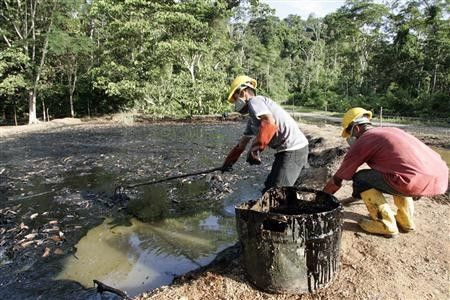Chevron Gets Federal Judge To Consider Order Barring $18 Billion Ecuador Claim

Chevron, (NYSE: CVX), the No. 2 U.S. energy company, lost a bid to get a federal judge to bar an Ecuador aboriginal group from collecting $18 billion in pollution damages.
Still, in New York, U.S. District Judge Lewis Kaplan took under advisement Chevron's request that its assets be attached to the court, an important move that would strengthen its defense. He also reserved judgment on placing a temporary restraining order against the government of Ecuador. Chevron has also sued the Ecuadorean groups for alleged racketeering.
The two sides traded blows before Judge Kaplan adjourned the hearing after roughly an hour of arguments.
The only thing they are hanging their hat on is the fig leaf - that there was a judgment in Ecuador, said Randy Mastro, a lawyer representing Chevron. They have not put forth one shred of evidence contradicting the [racketeering] case.
Craig Smyser, representing several Ecuadorean defendants in the racketeering case, pointed to allegations that Chevron had manipulated testing sites and operated two separate laboratories to cover up its tracks.
In court Thursday, Chevron's lawyers again denied that Texaco, which Chevron acquired in 2001, had polluted any lands in Ecuador. Chevron has lost a pollution case in that Central American republic where courts impose and later upheld an $18 billion fine.
In response, Chevron has alleged racketeering by thousands of Ecuadorean villagers and aboriginals, who accuse the company of polluting swaths of the Amazon jungle.
Chevron's lawyers alluded to comments made by Ecuadorean defendants suggesting they might seize Chevron's assets in Venezuela and Latin America, such as oil tankers that sail through the Panama Canal.
If approved, the restraining order will last as long as Kaplan considers Chevron's request.
Last February, an Ecuadorean court ordered the company to pay the Texaco fines. Chevron disputed the initial judgment.
By attaching itself to the court, Chevron hopes to construct a legal method to bar any Ecuadorean seizure of assets. Kaplan will make a determination on Chevron's request at a future date.
Thursday's hearing continued what has been a litigation saga dating back a decade. Kaplan earlier allowed the racketeering and corruption case to move forward.
Ecuadorean courts have upheld the ruling originally made by a local judge, and have so far verbally announced they will ignore injunctions placed on them by an arbitration panel based in The Hague.
That panel said on Feb. 28 it would consider an appeal by Chevron.
The company still has a pending appeal with Ecuador's high court.
Last year, the 2nd U.S. Circuit Court of Appeals in New York threw out an injunction filed by Kaplan to bar the collection of the $18 billion fine. The court also turned down a Chevron request to throw out the case.
Shares of Chevron fell 76 cents to $109.93.
© Copyright IBTimes 2025. All rights reserved.





















